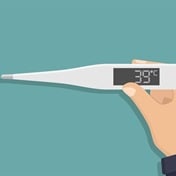
What is thyroid-stimulating hormone (TSH)?
The thyroid gland is a gland situated in the neck and secretes the thyroid hormones thyroxine (T4) and tri-iodothyronine (T3). These hormones are essential for the normal growth and metabolism of all body tissues and control the basal metabolic rate. They also play an important role in of proteins, carbohydrate and lipid metabolism. An example of this is the raised cholesterol levels in patients with hypothyroidism.
For the thyroid to be able to secrete these hormones, it needs to be stimulated. TSH is a hormone secreted by the pituitary gland in the brain. The pituitary gland is under the control of another section of the brain, the hypothalamus, where another hormone, thyroid-releasing hormone (TRH) is secreted. TRH stimulates the secretion of TSH. TSH travels from the pituitary gland in the bloodstream to the thyroid, where it stimulates the secretion of thyroid hormones, T4 and T3.
If the patient's thyroid is producing excess thyroid hormone (hyperthyroidism or thyrotoxicosis), the TSH level is suppressed. Conversely, if the patient's thyroid is producing too little thyroid hormone (hypothyroidism), the TSH levels increase in an attempt to try and stimulate the thyroid gland to secrete thyroid hormone.
TSH is very sensitive to thyroid derangements and may be used alone as a first-line thyroid function test. If it is normal, thyroid function may be considered normal and if not, then T4 or T3 is determined to diagnose the abnormality.
Hypothyroidism:
This is a disorder due to decreased functioning of the thyroid gland. It may be due to disorders of the thyroid gland itself (primary hypothyroidism) of due to disorders of the pituitary gland (secondary hypothyroidism). This disorder usually develops slowly, and due to its non-specific symptoms is often missed or misdiagnosed as depression.
Common symptoms include:
- lethargy/tiredness
- cold intolerance
- weight gain
- dry skin and hair
- hoarseness
- constipation
Hypothyroidism is common in the elderly. It is easily treated by means of replacement therapy (Eltroxin). TSH can be used to diagnose hypothyroidism and also to follow up compliance in patients on Eltroxin.
Congenital hypothyroidism (cretinism), which presents from birth, is a relatively common disorder and is treatable. However if the diagnosis is missed, it can lead to growth and mental retardation in the affected child. For this reason, all newborns are screened with a TSH measurement.
Hyperthyroidism:
This is mostly due to an overactive thyroid gland (primary hyperthyroidism), but may also be due to over-treatment with Eltroxin. In very rare cases, it is due to oversecretion of TSH by the pituitary gland.
Common symptoms include:
- weight loss in spite of a normal appetite
- sweating/heat intolerance
- fatigue
- palpitations
- agitation/tremors
- generalised muscle weakness
- diarrhoea
- menstrual abnormalities
- protruding eyes
- goitre (swelling of the front of the neck)
TSH can be used to diagnose hyperthyroidism, as the raised thyroid hormones will suppress TSH secretion from the pituitary gland. The TSH value will therefore be decreased or undetectable when measured in the laboratory.
Why is TSH measured?
- increased in primary hypothyroidism (underactive thyroid gland)
- normal of decreased in secondary hypothyroidism (problem in the pituitary gland)
- decreased/suppressed in primary hyperthyroidism (underactive thyroid gland)
- increased in secondary hypothyroidism (problem in the pituitary gland)
- used for follow-up of patients on Eltroxin to monitor dosage and check compliance
How should I prepare?
A random blood sample is taken for TSH determination. No specific preparation is needed, and if you are on Eltroxin, continue regular intake.
How is the procedure performed?
A small amount of blood is drawn from your arm and taken to the laboratory for analysis. Other than a minor amount of discomfort, there are no risks involved. You may bleed slightly after the procedure, but if pressure is applied to the area, this is unlikely. You may have a slight bruise in the area if your veins are difficult to find.
What are the limitations of the procedure?
Certain drugs may affect thyroid function tests. Examples are lithium (used to treat certain psychiatric disorders), amiodarone (used to treat cardiac rhythm abnormalities), certain anticonvulsants, heparin (decreases the probability of blood clots forming) and aspirin.
In systemic illness, the normal regulation of T4, T3 and TSH becomes disturbed. TSH may be decreased with low T4 and T3 levels with no evidence of thyroid disorder. This corrects itself once the patient recovers and is known as "non-thyroidal illness".




 Publications
Publications
 Partners
Partners















